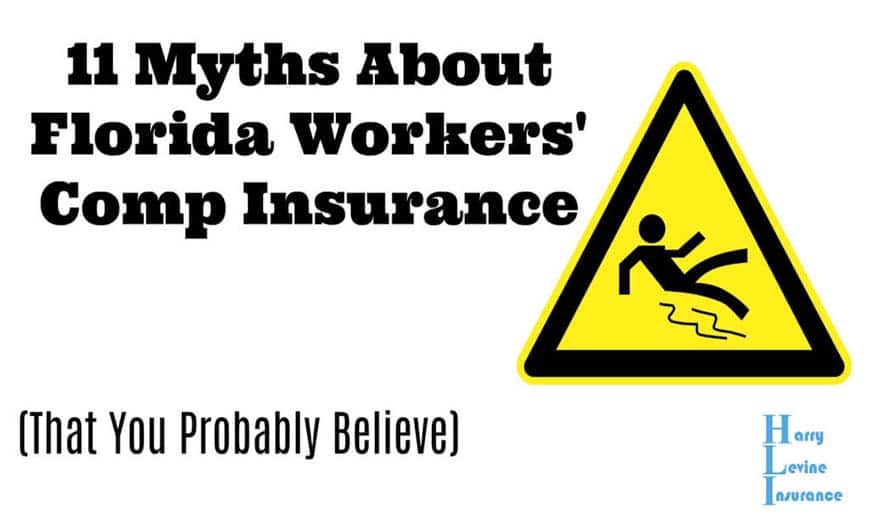You’ve heard of workers’ compensation. You may even have had employees who needed it when they were injured at work. But there is also a lot of misinformation about workers comp insurance in Florida that you might believe.
Misinformation that could be preventing you from getting high-quality coverage or lead you to think you don’t need to carry workers compensation insurance at all.
As a Florida insurance agency, our goal is for all of our clients to have the right amount of workers’ comp coverage for their property, person, and business. And whether you work for or own a small business, you need to know the complete truth about Florida workers’ compensation insurance.
Myth #1. “Workers’ comp insurance is too expensive.”
For some reason, too many business owners think of workers’ comp insurance as a luxury. But this type of thinking can lead to disastrous results for their business.
For one thing, if your business is among those that are required by Florida state law to carry workers’ comp insurance, you will be faced with a Stop-Work Order and have to pay a fine if you are found to be in violation of the law.
In many cases, the penalty plus the amount of lost income is much more than the cost of paying your premiums. In addition to these penalties, you will also have to pay out of pocket if any employees injure themselves on the job.
Even if your business isn’t required to carry workers’ comp, it’s still better to have it. Workers’ compensation premiums are based partly on your payroll, and there are limits in place to prevent you from having to pay out the nose.
What is too expensive is losing your business entirely because an injured employee decides to sue. Going without workers’ comp just to save a few bucks isn’t worth it.
Myth #2. “Only large businesses need workers’ comp. My employees are only part-time (or related to me).”
Regardless of the size of your business, workers’ comp insurance is always a good idea.
In fact, most states think workers’ comp is so important, that they require businesses to carry it. In Florida, your business industry will often determine whether you are mandated to carry it.
In the construction industry for example, you must have Florida workers’ compensation insurance if you have one or more employees. For non-construction businesses (excluding the agricultural industry), you must have a workers’ comp policy if you have four or more employees, including part-timers.
And yes, your family members count as employees.
Myth #3. “My employees’ jobs aren’t dangerous, so I don’t need workers ‘comp.”
There’s a misconception that construction sites, warehouses, and factories are the only locations that workplace injuries can happen. This is simply untrue. In fact, office workers are more than twice as likely to suffer a workplace injury than non-office workers.
Not only are office workers rarely given safety training (like construction workers are), but there are often hidden dangers around the office. Employees trip and fall over office equipment, sprain their neck while cradling the phone, or even come to blows over a work-related dispute.
Injuries can happen anywhere and the right insurance coverage can protect your business from ruin.
Myth #4. “My employees are like family. They would never sue me.”
It’s a comforting thought (and it probably makes it more pleasant to go to work every day), but how confident are you that no situation exists to make your employee consider suing you?
In a country where people have been known to sue or disown their own family members, no business can claim that they are too much like family to have a lawsuit on their hands.
I’m also willing to bet that your employee’s family isn’t as loyal to you. If an employee dies as a result of their workplace accident, surviving family members often sue the employer for negligence.
If you think of your employees as just like family, treat them like it! Give them the respect and consideration they deserve by making sure they will be provided for in the event they are injured on the job.
Myth #5. “I don’t need to carry workers’ comp. I’ll just pay for any injuries out of pocket.”
If you have only one or two employees, it might seem more tempting to take your chances and not carry Florida workers’ comp insurance. After all, what are the odds that your only employee will develop a serious injury or illness while working? And even if they do, their medical bills are bound to be less than the cost of the premiums, right?
It sounds like a good idea in theory, but there are way too many ways that this situation could go wrong. After all, no one can prepare for accidents; that’s what makes them accidents. So what happens when your employee loses a limb or when they experience complications from the injury weeks, months, or years later? Those medical costs add up quickly.
Besides, if you only have two employees and you lose one of them to a work-related injury or illness, you’ve just lost half your team. Is that a risk you’re willing to take?
You can’t predict which type of accident your employees are more likely to suffer from and what the fallout of those injuries will be. In the end, having a workers’ comp insurance policy is the safest bet.
Myth #6. “I don’t have to carry workers’ comp insurance if I call my employees ‘independent contractors.'”
This is technically true.
Independent contractors are not eligible for workers’ compensation coverage. But your employee does not become an independent contractor just because you say she is. The definition of independent contractor is set by the IRS, and misclassifying an employee as an independent contractor can have serious consequences.
Not only is this practice illegal, but it’s also unfair to your employees and morally wrong.
And if your independent contractors don’t carry and provide proof of their own workers’ compensation insurance, the responsibility falls back on you. So not only could your uninsured independent contractors still sue you if they are injured on the job, but your insurance carrier will also charge you a premium for your uninsured independent contractors when they audit your policy each year.
Myth #7. “I don’t have any employees, just subcontractors. I don’t need workers’ comp.”
In absolutely perfect circumstances, this scenario checks out. But when was the last time you heard an insurance company rely on circumstances being perfect?
The relationship between contractors and subcontractors can be a tricky one, especially when it comes to insurance. Subcontractors are responsible for providing their own employees with workers’ comp, but if they don’t, you will be held responsible if any of those employees has an injury.
Myth #8. “You can reduce the cost of workers’ comp insurance by reporting a lower payroll.”
Since workers’ comp premiums are based partly on your company’s payroll, some business owners (and even insurance agents!) have gotten creative when it comes to saving money. By reporting a lower payroll amount, they are writing policies at much lower rates.
We’ve talked about this (illegal) practice before. Not only will your deception be uncovered during the annual workers’ comp audit, but you will have to pay a fine equal to “ten times the amount of the difference […] and reasonable attorney’s fees.”
The fines, criminal charges, and lost income (since you will be forced to cease operations) of your lie could spell the end for your business.
Myth #9. “Most workers’ comp claims are fake.”
A study by the University of Michigan found that only 1-2% of workers’ comp claims are fake, so it’s unlikely that your employees are scamming you.
If you suspect that one of your employees is faking an injury, report the incident to the Division of Workers’ Compensation and the Bureau of Workers Compensation Fraud. Fraud is not just illegal; it also causes insurance premiums across all industries to go up.
Myth #10. “My employees will ask for compensation for ‘pain and suffering’ and take advantage of me.”
No business owner likes to think that their employees are taking advantage of them. But when it comes to workers’ comp, this is simply impossible.
When you purchase Florida workers’ compensation insurance through an insurance company, you pay your monthly premiums and that’s it. Any workers comp claims that occur will be paid by your insurance company.
What’s more, Florida laws dictates that “pain and suffering” are not covered by workers’ compensation.
Myth #11. “The injured employee’s claim is paid, so my obligation is over.”
Not so fast!
A workers’ comp claim being paid doesn’t necessarily mean that your employee is cleared for work. Your role as the boss is to monitor your employee’s recovery and safeguard their return to work from further injury.
By assuming that they are “back to normal” and putting them back into the job that injured them in the first place, you risk slowing, halting, or even reversing the recovery that’s happened so far.
Instead, speak to your employee (after they have spoken with their doctor) to work out a plan for transitioning them back into their normal role.
Harry Levine Insurance Can Help Answer Your Florida Workers Compensation Questions
Workers’ comp coverage in Florida isn’t a luxury or a way to scam you. It’s a way to protect your business from risk, and in some cases, it’s the law.
Understanding what workers’ comp insurance is (and what it isn’t) will help you protect your company and your employees so you can stay in business for a long time.
If you’re in need of a Florida workers’ compensation insurance quote or any other type of business insurance, call us today to get started.
Save










